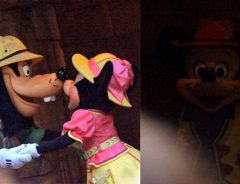- Tags:
- Anri Kawai / Japanese politics / Katsuyuki Kawai / Scandal / Voting
Related Article
-

An AI Candidate Is Running For Mayor In Tokyo, Promising Impartial Politics
-

The times Japanese politicians put their foot in their mouths
-

Tokyo Disney Fan Captures Mickey Mouse’s Heartbreak As Minnie Has Shocking Affair With Goofy
-

Former AKB48 idol Minami Minegishi who famously shaved her head announces marriage
-

How a 19-year-old Haiku poet is turning Japanese politics upside-down
-

Japanese YouTubers’ Flagrant Food Waste Leaves a Bad Taste in Everyone’s Mouth



On Thursday, prosecutors arrested Katsuyuki Kawai, a member of the lower house member known for his close ties to Prime Minister Shinzo Abe, and his wife Anri, a member of the upper house. The couple are accused of buying votes for her in the House of Councillors election in July 2019 in which she secured a parliamentary seat for the first time.
Sources disclosed on Wednesday that the majority of the approximately 100 people to have been questioned by police in relation to an alleged vote-buying scandal had admitted receiving money from Katsuyuki Kawai, a former Justice Minister, and his lawmaker wife.
Prosecutors suspect the 57-year-old former minister and his wife handed out about 24 million yen ($223,000) to local prefectural assembly members and about 1.5 million yen to city assembly members in Hiroshima Prefecture, Anri Kawai’s precinct, in exchange for supporting her bid for office.
Kittyomu / CC BY-SA
The scandal may prove the biggest challenge PM Shinzo Abe has had to face this year. Katsuyuki Kawai is a former policy adviser to Abe and the head of a Liberal Democratic Party caucus that backs Chief Cabinet Secretary Yoshihide Suga. He became Justice Minister after a reshuffle last September but stepped down the following month, when the scandal first came to light.
Taisyo / CC BY
On Tuesday, Anri Kawai's secretary received an 18-month prison term, suspended for five years, for illegally paying campaigners during her employer’s election campaign.
In response to the ruling, Anri Kawai said that she took the ruling “seriously” and would “watch how the case develops as the ruling has yet to be finalized.”
She said her lawyer had advised her not to make any comment about the allegations. The lawmaker will likely lose her seat when her secretary's sentence is finalized, under a guilt-by-association clause of the election law.
On Wednesday, the Kawais offered to leave the ruling Liberal Democratic Party, but party sources said they have no intention of stepping down as lawmakers.
Speaking to reporters after the end of the plenary session of the House of Representatives, the former justice chief apologized to all parties concerned for “causing trouble,” but denied breaking the law. The probe into the Kawais has been led by prosecutors in Hiroshima, but it is expected that a team from the Tokyo District Public Prosecutor’s Office will take over the investigation due to its highly sensitive nature.
Earlier this year, the weekly Shukan Bunshun reported that two Hiroshima chapters of the ruling LDP, headed by Katsuyuki and Anri Kawai, received ¥75 million each from party headquarters in the run-up to last July’s Upper House election. But Katsuyuki had his money diverted to his wife, bringing her total to ¥150 million, an unusually high amount to target at a single district in an election. It is suspected that some of the money was used to fund the alleged vote-buying scheme.
The Shukan Bunshun report raised suspicions that Abe orchestrated the influx of money in order to oust incumbent LDP heavyweight Kensei Mizote, who is viewed as a long-time political opponent of the prime minister. For the election, the LDP fielded both Anri Kawai and Kensei Mizote in the two-seat Hiroshima district, splitting the votes of its supporters. LDP headquarters gave strong backing to Kawai and as a result, Mizote lost his seat.